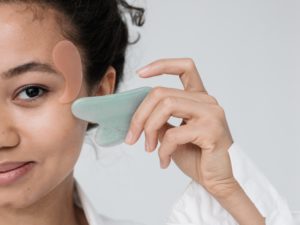The Importance of Vitamin D – How to Safely Get Some Sun
Everyone and their mother always tells us that we need sun protection, some form of SPF to protect us from the dangerous and harmful rays of the sun. I know, this opposes the title of this article. In reality, the sun plays a critical role in our wellness, and knowing how to safely take in the sun is vital, particularly for vitamin D production.

The sun is not only important for our mental health and physical health, but it is also essential in the production of vitamin D, A hormone and nutrient that many individuals are deficient in. Keep reading to find out everything you need to know about vitamin D, how the sun helps, and how to safely expose yourself to the sun’s rays.
What is Vitamin D
Vitamin D is a nutrient that we can both create and eat. It is not abundant in food sources, so it’s much more efficient for us to make our own. This fat-soluble vitamin can be found as D2, the precursor to vitamin D, but it is usually seen as D3. Vitamin D is essential for the wellness of our bodies. It plays an important role in many biological processes from bone health, to metabolism, and more.
Role and Function in the Body
So, I think vitamin D is most known for its role in bones. It helps to remineralize bones, reducing the risk of fractures and osteoporosis.
Vitamin D is also involved in the immune system. It helps to activate t cells which are the cells in the immune system that find and destroy pathogens such as viruses and bacteria. T cells can only be activated with this vitamin and will remain dormant without this important nutrient. This means that a decrease in this vitamin makes you more likely to get sick.
Vitamin D is also called a hormone. This is because all the cells in our body have a receptor for it. It can influence over 200 genes and is involved in neuromuscular function, which alters the way we move. This vitamin can also help to reduce inflammation and is an active participant in cell growth. Vitamin D is even part of our metabolism. This nutrient helps fat to be used as energy and is involved in energy production and insulin sensitivity. A deficiency in this vitamin May mean a disrupted metabolism that tends to store more fat. Deficiencies are also associated with inflammation, oxidative stress, and hyperglycemia.
Importance of Sun in Vitamin D Recreation
Vitamin D is called the sunshine vitamin. Both forms of this vitamin, D2 and D3, can be formed by the body when the skin comes into contact with the sun’s UVB light rays. A protein called 7-dehydrocholesterol (7-DHC) in the skin is activated upon contact with sunshine, converting which converts 7-DHC into vitamin D3.
Benefits of Sun Exposure
Aside from the production of this vitamin, the sun is also important for our health. More exposure to natural light can help improve mood by releasing more happiness chemicals into the body. The vitamin D that the sun’s rays help us produce can help strengthen our bones and teeth. Aside from that, the sun’s rays can help reduce bacteria on the skin, which can help rebalance skin microbiota, reducing acne and inflammation.
The sun also increases the amount of white blood cells in the body. These cells are responsible for protecting us against infection, meaning the sun can strengthen our immune system. Natural light also helps us regulate our waking and sleeping cycles. The more sun exposure we have in the morning early on in the day, the more energy will feel throughout the day and the sleepier will feel at night.
How to Prevent Sun Damage
The biggest issue with sunbathing and sun exposure is how harmful the sun can be. Too much of a good thing can also lead to more free radicals that cause oxidative stress and damage to the body. It is important for us to make sure that we are preventing Sun damage. Too much sun exposure can lead to sun poisoning, sunburn, and even life-threatening diseases such as skin cancer.
All we need to do is take in the right amount of Sun at the right time. We want to avoid tanning or burning since these are signs that we are taking in too much sun. The light of the afternoon, around noon to 4 pm, is usually when the sun is at its most intense. Avoid Too much exposure to the sun. The best time to get some sunlight is early in the morning when the sun’s rays are less harsh, or later on in the evening, right before the sun sets.
Listen to your body, feel, and pay attention. Do not expose yourself to too much heat too quickly. Depending on the intensity of the sun, a simple 5 to 10 minutes outdoors may be all you need. When the sun is less harsh, you might need 15 to 20 minutes. This also depends on your skin tone. Paler individuals may burn easier and require less time in the sun while individuals who have a darker skin tone may need a bit more time outdoors to get that vitamin D up.
Causes of Vitamin D Deficiency
Some causes of vitamin D are a lack of sun exposure. This may be due to living at different latitudes. For example, in North America, it is common for there to be a vitamin D deficiency spike in the winter due to a lack of sun exposure during those colder months when the sun is tilted away from the sun.
Another cause of vitamin D deficiency is the overuse of sunblock. If you are protecting the skin 24/7 every time you go outside, then you’re not allowing the sun to activate vitamin D production. Again, you don’t want a tan or burn. Just take a couple of minutes outdoors. Try to always protect the face of the skin and neck with SPF since that is much more sensitive than the rest of our body.
Symptoms of Deficiency
Some symptoms of vitamin D deficiency include inflammation, weight gain, insulin resistance, and a decrease in bone density. This vitamin is essential for health so a lack of it can impact us greatly.
Other symptoms of deficiency include muscle weakness, fatigue, or mood changes. Your muscles May ache or cramp up more, you may notice your bones ache or are prone to fractures, and you may feel anxiety, irritability, or sadness.
Eating Your Vitamin D
Another precursor to vitamin D is called ergosterol. This can be found in plants such as mushrooms. However, know that this is a precursor and you will still need some sun exposure to get vitamin D levels up.
Some foods have vitamin D. The best sources of this are fatty fish, fish liver oil, cheese, eggs, and beef liver. However, know that dietary vitamin D levels are low and it is much more efficient to just let your skin make it.
Supplements
Some individuals are fans of vitamin D supplements. While supplements are not highly regulated, if you find a trusted brand with third-party testing, supplementation may be the way to go. In North America, the dosage of this vitamin is said to be around 400 IU per day. This is controversial due to a lot of reasons and potential discrepancies, some of which can be found here.
Other places, such as in Europe, recommend that the daily dose of vitamin D be closer to 800 to even 2000 IU per day.
The Takeaway
Vitamin D is so important for so many biological processes, so we need to get enough of it. Make sure you are safely getting sun exposure so that you get all of those sunshine benefits and vitamin D for a boost in health.
Remember that health comes from within. Eat nutritious food, exercise when you can, and take care of your mental health. The small daily habits you cultivate become the basis for overall wellness. Don’t forget about microbiota health too! Gut microbiota affects the entire body, from the skin to muscles, to immune and mental health! Get all the resources you need about microbiota health for free here!





